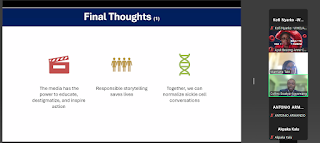Celebrating World Sickle Cell Day 2025 with a massive call for more communications on Sickle Cell to raise awareness and help reduce SCD numbers
20th of June 2025, the waves that swept across the global Sickle Cell Community with the celebration of #WorldSickleCellDay2025 seem to have dwindled into mere ripples.
Throughout yesterday, a great deal was said and done to advance the global Sickle Cell Disease (SCD) cause.
On my side, June 19 was a busy one, advocating for more communication on Sickle Cell Disease and the actions taken by all stakeholders.
The day began with the launch of the World Sickle Cell Day special edition of SOuL JustBe SCD Lifestyle Magazine:
Read the full magazine here: https://www.calameo.com/read/007354037ed05074ae3f8
A communication tool that I and a group of empowered lady warriors have been working on to showcase the different phases of living with Sickle Cell Disease, the challenges, and to share ideas on how to better navigate life with SCD.
Later, I participated in a webinar organised by the World Health Organization African Region office that focused on converging media efforts in Africa to support regional initiatives aimed at reducing the burden of Sickle Cell Disease on the continent. Before this event, I had sent out requests for ideas from warrior networks I engage with and from journalistic platforms, which I shared during the webinar. I was particularly interested in the current state of affairs regarding SCD. And it was disheartening, especially when Dr. Antoinio Armando of WHO Africa spoke about the rise in SCD-related deaths and births in the continent. My heart sank, and I wondered where all our efforts were going. The thought of 80 children dying each day from SCD in Africa sent shivers down my spine, reinforcing my belief that we need to communicate more.
I felt a bit relieved when Dr. Collins Boakye-Agyemang, of the WHO Africa bureau, presented ways in which the media could help change the narrative around SCD and suggested effective story angles. I wholeheartedly agreed with him on the importance of survivor stories, which strengthened my resolve to complete my current project, aiming to unveil it before the end of June. He also offered tips to journalists on how best to explain SCD to diverse audiences and shared best practices in covering SCD news.
I added a few points based on my observations from working on this topic and on communications, emphasising the need to plan communications rather than approaching it as an afterthought. This usually results in hurried messaging, leaving little time for media colleagues to be involved early, trained, and aligned with the cause. I also called for a 360° approach where not only the media but also SCD stakeholders themselves ensure robust communication about their projects and programmes, working hand-in-glove with target audiences and communicating in their languages.
My next engagement was a brief exchange at the women's session of the SCD 24-hour marathon organised by the Global Alliance of Sickle Cell Disease Organisations. Wao! Chapeau to the organisers! The topic I encountered was on women and living with SCD. I emphasised that living with SCD as a woman is akin to having a time bomb that could go off at any moment. Yet, we must learn to push aside that fear and live, nurture ourselves, and practise self-love. I shared my observation that women and mothers with SCD are deeply connected to their children, careers, and the condition itself, often losing themselves in this cycle. We forget to just live, rewarding ourselves for the incredible work we do across all these levels and beyond.
Later, I was approached by the news anchor of one of Cameroon’s most-watched private channels, Equinoxe TV, to speak on the prime-time news about SCD. The journalist in me eagerly seized the opportunity to advocate for government action on SCD care and awareness. I shared my experience as an advocate and reiterated the importance of communication, alongside better access to healthcare essentials like pain medication, folic acid, and infrastructure such as SCD clinics with trained staff. I reiterated a point I made during the WHO Africa webinar: we must stop viewing Sickle Cell Disease solely as a health issue and start recognising it as a development issue, especially since it devastates one of the world's greatest resources—its human capital.
Click here to watch the full newscast: https://www.youtube.com/live/ZVT7Y0hikfc
As I write this blog and reflect on my contributions to World SCD Day, I admit that although I feel I have done a good job, I have only begun to scratch the surface of what is needed. The real realisation is that we are still at the 'on your marks' stage. We have yet to move to the 'get set' phase in our fight to raise global awareness of SCD, to establish equitable healthcare access for all those affected, and to create systems enabling them to survive and contribute to progress. We must educate those living with the genes to understand their role and make informed choices that reduce SCD births. Equally, we need to educate and inform those free of SCD about the condition to foster understanding, acceptance, and
support for those affected.
May the fire I saw burning continue to inspire us all across the SCD stakeholder community, galvanise us all to better prepare ourselves so we can enter the 'get set' phase of this cause and run together to the Go! phase.







Comments
Post a Comment